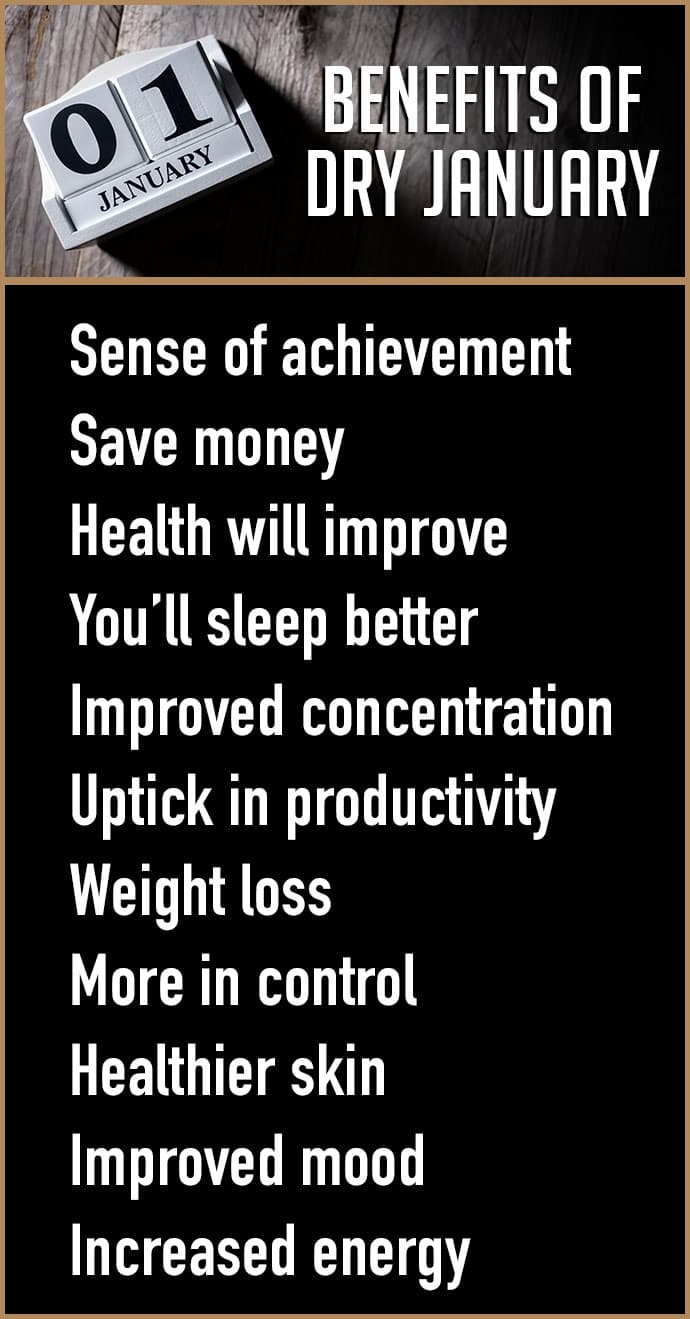Looking to reset after a festive season of too much celebratory bubbly? Or are you concerned about your problematic drinking? Whatever your motivation, you can kick off the year on a healthy note by taking part in Dry January.
If you’re wondering what is Dry January, it’s an annual tradition that challenges you to kick alcohol to the curb. The month-long pledge to abstain from alcohol is a chance to give your body and mind a break. It’s a time to reset, refocus, and recharge.
Interested? Read on as we explore the benefits of participating in Dry January and some tips to help you pull off an alcohol-free month.
What is Dry January?
So, what is Dry January really? It’s an initiative run by Alcohol Change UK, in which participants start a new year the right way by giving up alcohol for 31 days (or more). The campaign was launched in 2012 in the UK and has since spread across the globe.
The movement continues to grow in popularity every passing year as people recognize the health and financial benefits of sobriety. From a few thousand participants in 2013, Dry January is now observed by nearly 9 million people in the UK where it originated.
In the U.S., CGA—a data and research consultancy in the food and drinks market—reports that around 1 in 3 consumers (35%) took part in the Dry January challenge 2022—up from 21% in 2019.
What are the Immediate Benefits of Dry January?
Now that we know what is Dry January, why should you consider participating? What are the benefits of going a month without alcohol? Well, a lot. Quitting alcohol, even for just a month, comes with a long list of potentially life-changing benefits.
The truth is that alcohol is a significant problem in society—much more than most people are willing to admit. It may be legal for adults, readily available, and deeply engrained in our culture, but that doesn’t mean it’s safe.
According to the National Institute on Alcohol Abuse and Alcoholism (NIAAA), alcohol is the third-leading preventable cause of death in the United States. Economically, alcohol misuse costs the country nearly $250 billion.
And if you’re wondering how impactful a month of abstinence can be, here are some compelling benefits of trading happy hour for Dry January according to a survey by the University of Sussex:
- You’ll experience a sense of achievement
- Curbing your alcohol consumption will save you some decent money
- Your general health will improve
- You’ll sleep better
- Your concentration will improve, which can mean an uptick in productivity
- Weight loss: You may shed a couple of pounds
- You may feel more in control of your relationship with alcohol as you learn more about your drinking patterns and triggers
- You may realize that you don’t need alcohol to have a good time
- Your skin health may improve
- You’ll experience improved mood and energy levels
Does Dry January Have Long-Term Benefits?
While Dry January is widely seen as a temporary test of willpower, it can lead to long-lasting changes. It’s an opportunity to form new and healthier habits that can be empowering in the long run. And the immediate health benefits you experience such as improved sleep, more energy, better concentration, weight loss, and better skin can reinforce the new habits.
In fact, participants in the earlier-mentioned University of Sussex survey reported drinking less in the months after Dry January. This implies that the simple act of abstaining for a month can improve your relationship with alcohol in the long term. It’s a great introduction to sober curiosity.
Unlike traditional public health messages that spread a ‘punishing message’ of how alcohol is bad for you, facing the world without a sip (or a few) of alcohol for a month sends a reinforcing message. You get to personally realize how sobriety improves how you look and feel—which can motivate you to continue.
As Dr. Richard Piper, CEO of Alcohol Change UK, puts it, “The brilliant thing about Dry January is that it’s not really about January. Being alcohol-free for 31 days shows us that we don’t need alcohol to have fun, relax, and socialize. That means that for the rest of the year, we are better able to make decisions about our drinking, and to avoid slipping into drinking more than we really want to.”
Tips to Succeed with The Dry January Challenge
Abstaining from alcohol is not always easy, but it can be done. If you’re considering participating in Dry January, here are some tips to help you succeed:
- Have a Clear Plan: Know your boundaries and have a plan for how you’re going to turn down a drink. How are you going to say No? How will you circumnavigate your triggers?
- Practice Gratitude and Self-Compassion: Focusing on what’s wrong in your life only makes it harder to cut back on your drinking. Approach the month-long sobriety from a positive place and be thankful for how far you’ve come. And even if you slip up, be kind to yourself and march on. Gratitude jars are an excellent way to acknowledge, remember, and savor the goodness in our lives.
- Maintain a Journal: Documenting your goals and progress can be a source of motivation and accountability. The “Try Dry” app by Alcohol Awareness UK can help you monitor your progress.
- Manage Triggers: Knowing your drinking triggers and switching up your routines can help reduce the temptation to grab a drink.
- Healthier Alternatives to Alcohol: Think about what alcohol does for you. Is it calm your nerves? Try a relaxing hot bath or grounding exercises such as a brisk walk for a calming effect. Or do you drink out of habit in social settings? Consider taking non-alcoholic beverages instead. And if you drink as a way to escape everyday stresses, having a bad day is not a reason to reach for a drink. Instead, explore healthier ways to manage stress such as exercise or getting an animal companion.
- Recruit a Friend: Going Dry this January can be hard, but the encouragement, support, and accountability of a sobriety partner can help you get across the finish line.
Know When to Seek Professional Help
As the festivities of the holiday season fade away, let us embrace the opportunity to give our bodies a break from the burden of alcohol. Let’s raise a (non-alcoholic) glass to a healthier and happier new year.
But while Dry January is a great initiative in the fight against alcohol, the month-long challenge is not advisable for everyone. We discourage participating in the campaign if you’re psychologically or physically dependent on alcohol. Quitting cold turkey for the month may cause uncomfortable and severe alcohol withdrawal symptoms.
If you’re concerned about your alcohol dependence, consult our team of acclaimed detoxification and addiction experts to help you start a path of sobriety safely.






